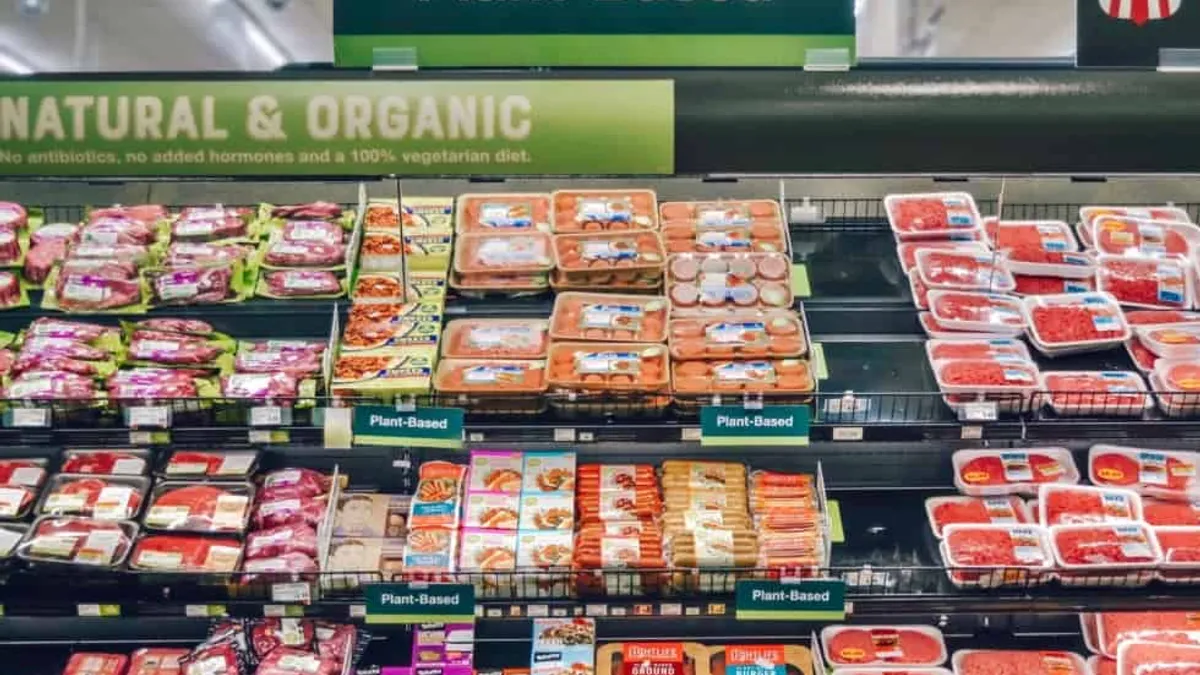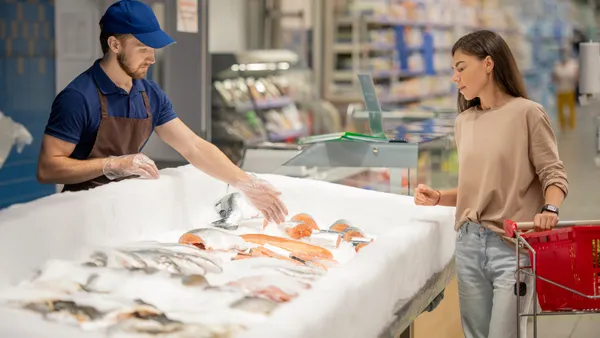Dive Brief:
- Plant-based meat sold 23% better in stores that placed products in the animal-based meat section, according to data released this week by Kroger and the Plant Based Foods Association.
- Between December and February, 60 Kroger-owned stores in Colorado, Indiana and Illinois sold plant-based meat in a three-foot set within the conventional meat section. The grocer also sent targeted emails to 1.8 million customers to tell them about the new set, and created a dedicated website with more information and recipes.
- The stores and regions were chosen to represent areas with differing awareness and adoption of flexitarian diets. All of them saw more plant-based sales when the items were placed in the conventional meat section. In the Midwest, where plant-based is more of an emerging trend, sales were up 32%. In Colorado's King Soopers stores, where plant-based meat adoption is higher, sales increased 13%.
Dive Insight:
As more plant-based meat brands appear on grocery shelves, there still is no consensus on which coolers those products belong in. Individual stores are allowed to decide where plant-based meats are sold. Some retailers keep plant-based products in their own section, marked "plant-based" or "vegan." And on the opposite side of the spectrum, plant-based meat has been sold in one grocer's butcher case, custom weighed and packaged for consumers.
Adoption of plant-based products is climbing, with the category worth more than $939 million in 2019, according to SPINS statistics from the Plant Based Foods Association. More consumers — both vegetarian and not — are seeing these products as a substitute for the meat traditionally at the center of the plate.
Sales have been on a steep upward climb since the beginning of the year, especially since shelter-in-place orders associated with the coronavirus pandemic have kept consumers in their homes. The Plant Based Foods Association found during the pandemic that sales have grown twice as quickly as those for conventional meat. According to Nielsen, in the four months ending June 20, sales of fresh meat alternatives are 218.6% higher than last year.
Putting these products where consumers are looking for meat is a good way to stoke these sales. More than seven out of 10 consumers who tried plant-based meat last year were either wanting to try something new or were curious about the products, the International Food Information Council found. And considering plant-based meat manufacturers say their target consumer is someone who loves animal meat, forcing this individual to seek out a different section of the store may mean lost sales.
The study shows convenience pays off in terms of plant-based meat sales, as well as customer service for the stores. As part of the study, Kroger did customer interviews and found several people were surprised by the variety of plant-based options and appreciated that everything was in one place.
In the Midwest, stores with the plant-based setup attracted about a third more new shoppers than other Kroger stores. Consumers purchased a 33% larger variety of plant-based products, and plant-based purchase occasions increased by about a third. In Denver, the plant-based setup attracted 14% more new shoppers and expanded the variety of plant-based products purchased by 16%.
Putting plant-based meat in the regular meat case could prove lucrative, but stores need to be mindful of signage and displays to ensure there is no consumer confusion. While plant-based food makers argue labeling makes it clear their products do not contain meat, consumers have been unsure. A study released earlier this year from the National Cattlemen's Beef Association found only 45% of consumers thought plant-based meat was vegan. The rest think it contains some meat or animal byproducts. State laws to force labeling changes on plant-based meat products have so far been unsuccessful, leading to lawsuits that have often ended with both sides coming to an amicable resolution.
Today's plant-based meat looks more like the animal product it replaces, and consumers not paying attention to labels could mistake a plant-based product for a conventional one. A photo of one of Kroger's test stores shows signage indicating the products are plant-based above the display, on each shelf and bookending the products. This kind of display could help stores both cater to convenience and ensure consumers know what they are buying.














